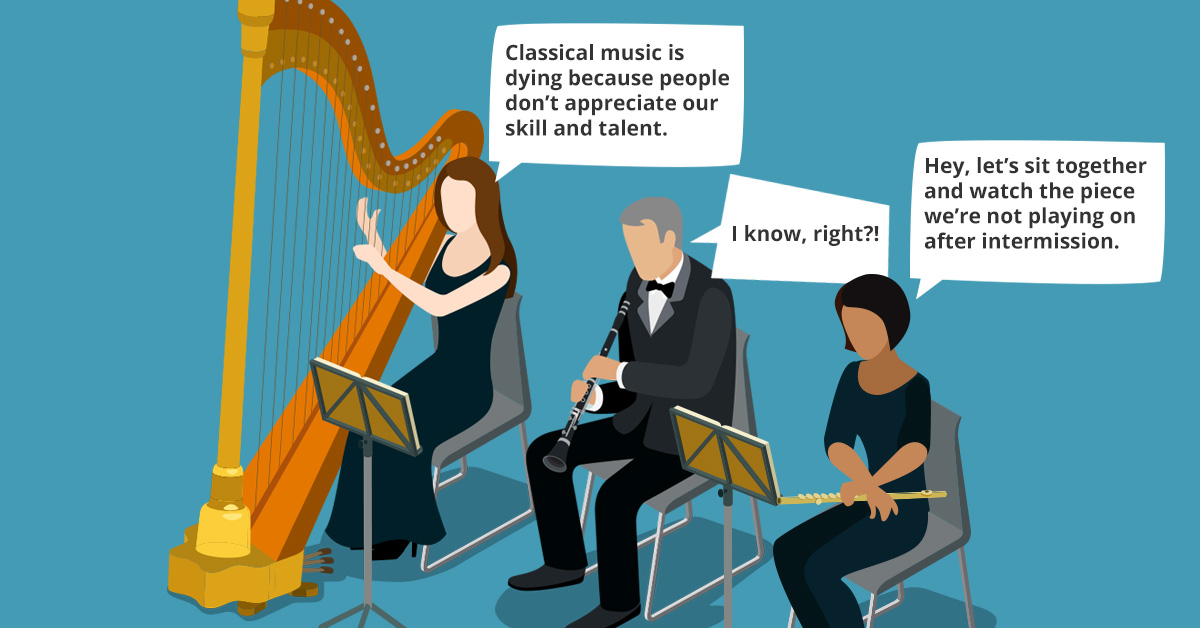On Saturday, 12/2/17 the Minnesota Orchestra presented a concert featuring a guest artist known for writing music inspired by politics, his passion for opera, love, and family relationships. During the second half of the performance, the artist addressed the audience expressing concern over the recently passed GOP tax plan.
Before his address to the audience was complete, the orchestra’s principal trumpet decided it offended his political sensibilities to such a degree that he decided to leave the stage and refused to perform on the rest of the concert, which included a piece featuring solo trumpet.
 The 12/5/17 edition of the Minneapolis Star Tribune published an article by Chris Riemenschneider that provides additional details. The Star Tribune published another article on 12/8/17, by Terry Blain, that featured an interview with the principal trumpet, Manny Laureano, who has been a member of the orchestra since 1981.
The 12/5/17 edition of the Minneapolis Star Tribune published an article by Chris Riemenschneider that provides additional details. The Star Tribune published another article on 12/8/17, by Terry Blain, that featured an interview with the principal trumpet, Manny Laureano, who has been a member of the orchestra since 1981.
In addition to those articles, Laureano decided to publish an account of the incident on 12/5/17 at his website.
The entire ordeal is troubling on multiple levels, but we’re going to review some of the key points as well as examine options related to how the employer should address the corresponding problems.
A Profound Lack Of Judgement
That evening’s guest artist, Rufus Wainwright, makes his politics no secret. It isn’t unusual for him to make politically driven remarks during concerts and as Riemenschneider’s article reports, Wainwright expressed concern over the GOP’s recently passed tax plan.
This, combined with the guest artist’s approach to the holiday number Cantique de Noël, triggered Laureano to disturb an ongoing concert by leaving the stage mid-performance. Wainwright also took a dig at former Senator Al Franken but Laureano did not include this among his list of trigger issues.
“[Wainwright]’s an angry dude that seems to have life all figured out, not the kind of guy we need to look to for philosophy,” he said. “I found it to be beyond the pale of what that evening should be about. It’s a time of the year we’re supposed to all come together.”
In Blain’s interview article, Laureano ascribes a state of mind and motivations to Wainwright with neither evidence nor cause.
“When Rufus Wainwright made his comments, I felt completely unwanted — that he would not want anything to do with me if he knew who I was and what I believed.”
Laureano continued saying he believed members of the audience would assume any sentiments a guest artist says from the stage risks being ascribed to each individual orchestra musician.
“But this particular tirade of divisiveness just really hit me in a spot that made me feel like I could not sit there and tacitly be seen as in agreement.”
Laureano Coerced His Colleagues Into A Position Of Supporting His Political Viewpoints
Although Laureano clearly spent time thinking about how put-upon he was to participate in the concert, he didn’t afford that benefit to his colleagues.
According to his personal account, Laureano continues his penchant for not only assuming to know what other people think, but expands on this by presuming they will understand and commiserate.
Two other trumpeters were in the lounge, as they weren’t playing that piece and I told them to get on stage because I had had it and was leaving. They had heard the rant over the lounge speakers and understood quickly what was happening and got on stage.
Setting aside for a moment that only the employer has the authority Laureano was asserting, his insistence that the other musicians do what he took a stand against is, at best, puzzling and at worst, an abuse of his position as principal of his section.
Even if you share Laureano’s sentiment that the other trumpet players understood why he walked away from his performing duties, it takes a special type of hubris to demand they afford him the courtesy he just denied the guest artist, his on-stage colleagues, and concert-goers.
Laureano Put No Less Than One Substitute/Extra Musician In A Position To Fear Retribution If She Declined To Cover His Part After Abandoning His Performing Responsibilities
According to Laureano’s article, this is where things take an even darker turn (emphasis added).
“The woman playing second trumpet, bless her heart, played my solo and everyone did a great job, as I knew they would.”
According to the Minnesota Orchestra’s online musician roster, all four members of the trumpet section are men.
This indicates the woman Laureano referenced was either what the orchestra defines as a “substitute” (employed on a temporary basis to fill a vacancy for a period of one year or less) or an “extra” (employed on a per event basis to supplement the regular complement of staff musicians).
Assuming the Minnesota Orchestra operates in similar fashion to their peer ensembles, it is common practice for the principal of each section to vet all substitute/extra musician candidates. Consequently, the principal exerts a considerable amount of influence over which musicians do and do not get hired to fill the institution’s need for temporary musician.
When combined with the above point where Laureano acknowledges ordering the musicians to go on stage and fill in for him, it isn’t difficult to see where his actions as principal trumpet is tantamount to coercion.
It Isn’t The Employer’s Responsibility To Provide Trigger Warnings
Throughout his public statements, Laureano has repeatedly mentioned his decision to abandon his performing duties was not a planned act. Barring evidence otherwise, there’s no reason not to believe that account.
Having said that, he is clearly aware of just how deep his political passions run and it is no one’s responsibility but his to conduct due diligence on guest artists in order to determine if his political sensibilities may be offended.
Fortunately for Laureano, his collective bargaining agreement (CBA) requires his employer to provide musicians with no less than three months advance notice of all guest artists and related service schedules. This affords him a valuable resource for identifying any potential situations where he may feel as though his political convictions may be stressed beyond his comfort level.
The Employer shall give Musicians a preliminary schedule of services for each Winter Season and Summer Season a minimum of three (3) months prior to the beginning of such Season. An updated schedule shall be provided at least four (4) weeks prior to the beginning of each Season.
Moreover, the CBA affords Laureano multiple options to remove himself, with full pay, from events that cause him concern. Here are two:
- Relief Service Scheduling. The Employer shall assign and schedule relief services. A Musician’s request for a specific relief services shall be given every consideration. Whenever practicable, requests for specific relief services should be submitted, in writing, to the Employer at least four weeks in advance of the week in which the relief service is requested. Unless otherwise requested, the Employer shall make every effort to assign relief services to give the Musician the entire day off.
- Seniority Relief. Each Eligible Musician will be granted one (1) service relief per Season for each five (5) full years of completed employment with the Employer as of the beginning of such Season, to a maximum of six (6) relief services per Season, and will not be on call for such services. Musicians will be given at least three (3) weeks’ written notice of the scheduling of such relief services. Written notice of remaining relief services shall be provided by the Personnel Manager upon request of the individual Musician.
Both options provide Laureano with no less than two months to review and investigate whether an artist may engage his political trigger warnings and if so, request the paid time off. In the case of the latter, Laureano’s tenue with the orchestra means he enjoys the maximum amount of paid leave a musician can use.
Laureano could also approach the employer to request unpaid leave asserting that performing on the event would compromise his political beliefs. But in all likelihood, the employer would find a way to apply one of the multiple paid leave options.
A Litany Of Precedents
Artists refusing to participate in events due to political and/or social beliefs is nothing new.
- 8/7/17: A group of Santa Monica Symphony Orchestra musicians took exception to the employer hiring a guest conductor. They published an open letterwell in advance of the concert encouraging patrons not to attend and explained why they will not be performing at the event (details).
- Summer, 2017: A majority of honorees from the 2017 Kennedy Center Honors declined to attend a White House reception attended by President Trump. Honoree Carmen de Lavallade told the New York Times “In light of the socially divisive and morally caustic narrative that our current leadership is choosing to engage in, and in keeping with the principles that I and so many others have fought for, I will be declining the invitation to attend the reception at the White House” (details). Fellow honoree Norman Lear had similar remarks “This is a presidency that has chosen to neglect totally the arts and humanities — deliberately defund them — and that doesn’t rest pleasantly with me” (details).
- 1990: If you’re looking for something that reaches back in time consider when comedian Andrew Dice Clay was scheduled to appear on Saturday Night Live in 1990, female cast members indicated in advance they would refuse to participate in the show due to what they characterized as Clay’s misogynistic routines. In addition to cast members, that week’s female guest artist, singer Sinead O’Connor, bowed out as well (details).
In each of these instances, the artists involved did not shy away from making clear where they took exception with individuals and/or their viewpoints. However, none of these instances saw artists use an employer or honoring institution’s platform to advance their perspectives while an event was in progress.
Moving Forward: The Employer’s Dilemma
To date, the Minnesota Orchestra’s only acknowledgement of the incident is a brief statement to the Star Tribune.
“It doesn’t happen very often, but we honor the fact that guest artists will sometimes offer politically-minded comments as part of their performance — especially in the case of an issues-oriented songwriter like Rufus Wainwright. We believe Saturday night’s audience knew what to expect from Wainwright’s performance. We also understand that our musicians might politically disagree with an artist; we’re not aware that a musician has previously walked offstage in this way, but Manny’s brass colleagues stepped up in the moment and carried on with a great performance for the audience, which is our priority.”
As of 12/5/17, Laureano indicated he had not yet been contacted by the employer regarding any disciplinary issues, however, he did acknowledge a degree of culpability.
“Obviously my contract says I’m not supposed to walk off stage during a performance.”
By 12/8/17, Laureano acknowledged during his Star Tribune article interview he had met with the Minnesota Orchestra’s CEO to discuss disciplinary actions but it is unclear if the employer opted to implement any.
If the employer decides against implementing disciplinary action, it only encourages other musicians in the same ensemble to do the same. Moreover, it establishes a counterproductive precedent with regard to what the institution expects from musician employees in leadership positions.
While the infraction of abandoning performing responsibilities is the most egregious, the issue of coercion is a close second. Both infractions would qualify as just cause disciplinary measures, which the institution defines as such in their CBA:
Just Cause for Discipline or Discharge. Any Musician may be disciplined or discharged for just cause. Each Musician is expected to conduct him/herself in such a manner as to reflect professional credit on him/herself, the Orchestra and the Employer. Conduct reflecting discredit on the Orchestra and/or the Employer may result in disciplinary action or discharge. The right of discharge or disciplinary action shall be exercised by the Employer only after the Musician has been previously warned and after written notice of the existence of cause has been given to the Musician, the Union, and MOMC Chair. Any written warning shall not be in effect after a two (2) year period has elapsed from the date the warning was issued. In an emergency situation caused by a flagrant illegal act, Employer may immediately suspend the offending Musician without giving prior notice. If the Musician objects to the proposed dismissal in any of the instances referred to above, it shall not be effective until thirty (30) days later for purposes of terminating the Musician’s pay and benefits.
Unless Laureano has a record of similar documented infractions, these instances don’t rise to the level of just cause discharge.
Having said that, there is more than enough reason for just cause disciplinary measures for his direct actions and his related judgement.
In addition to a formal letter of reprimand, the employer would be entirely justified in docking his pay for services related to that concert event and requiring that he recuse himself from any decisions related to the hiring of extra musicians for a period of no less than one season.
They would also be justified in suspending Laureano without pay for a prescribed period of time and/or amending his individual agreement at the soonest available date to reduce any associated overscale and benefits in light of the abridged duties and responsibilities.
“In order to ensure accuracy and that every side to each issue is explored in detail, any individual or person officially representing an organization featured in an Adaptistration article is allowed to submit a response which will be published, unedited. Responses are limited to 200 words and must address the issues at hand and the individuals and/or organizations must also be willing to maintain an open dialog for continued discussion. In lieu of this option, individuals may opt for submitting a comment, which is subject to the terms above.”
Mr. Laureano is welcome to utilize this option.


